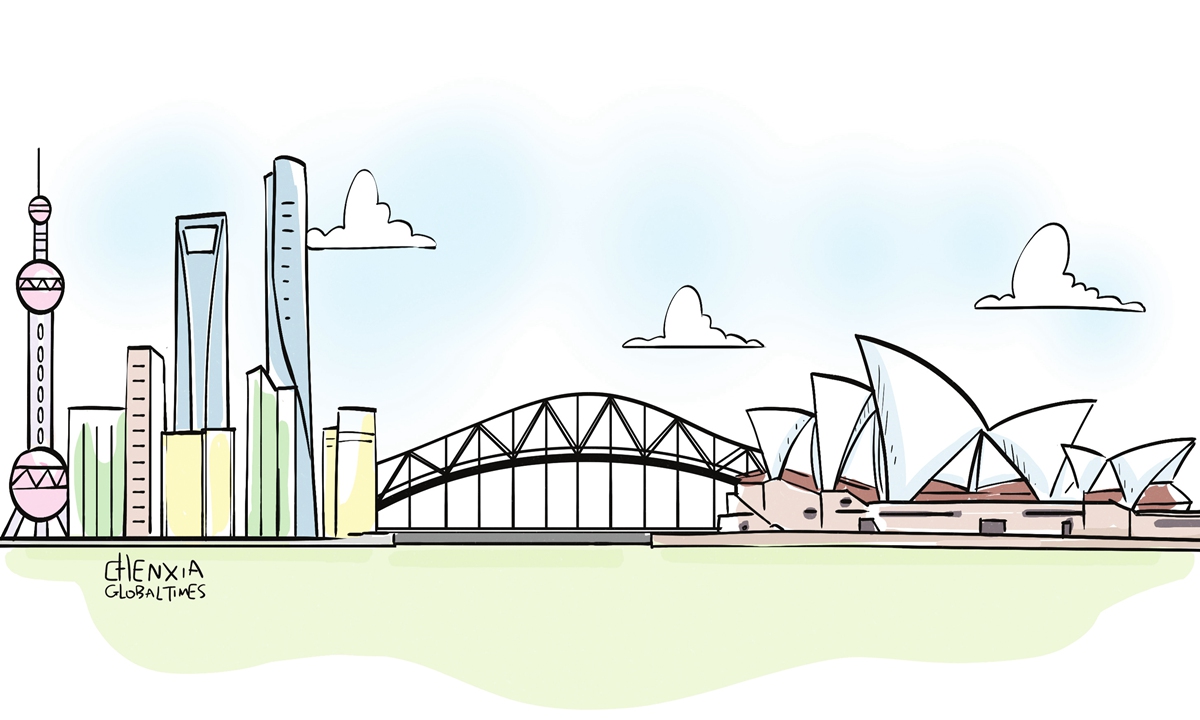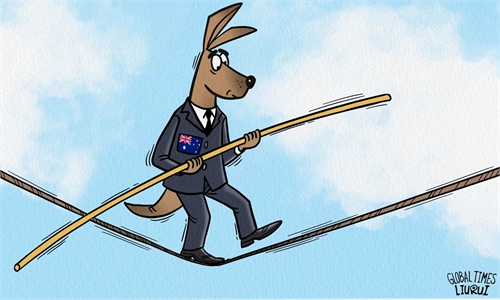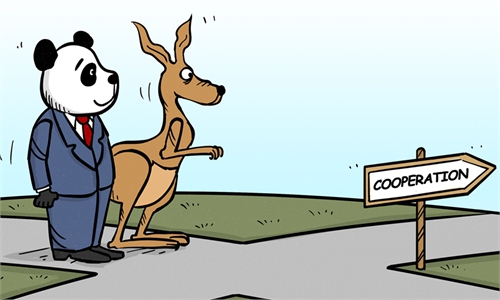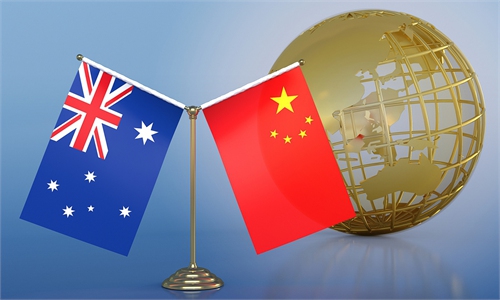Can Australia regain strategic maturity to return a ‘balance’ strategy with China, US?

Illustration: Chen Xia/GT
Australian Prime Minister Anthony Albanese has been busy with his summit diplomacy with the US, the country's military ally and most powerful friend, as well as China, the country's largest trading partner. The capability of keeping this strategy is a yardstick of a statesman's maturity as a political leader.An empirical review of the China-Australia relationship over the post-Cold War era can readily find it featured a paradoxical intergrowth of economic interdependence and political and security discords. The economic benefits for Australia that derive from the bilateral trade and economic cooperation shall, to a certain degree, be credited to John Howard for his initiatives of the "balance" strategy that leaves open the possibility of a sound, stable and prosperous partnership between the two countries.
Howard witnessed China's rapid economic growth in the post-Cold War era and the fast-increasing benefits for Australia arising from the country's trade and economic cooperation with China. As a heavily trade-dependent nation, Australia can hardly afford to pass up the opportunity of gaining entry to the Chinese market and investment destination at a time when it was at risk of becoming what Lee Kuan Yew, former Singaporean prime minister, predicted "a poor white trash of Asia" due to its declining economy, rising unemployment and mounting government debt.
In his visit to China in 1997, Howard emphasized the need for Australia and China to develop cooperation in all fields on the basis of mutual respect and mutual benefit. A visible shift in Australian foreign strategy came in the wake of the summit, which emphasized a "balance" between China, Australia's "new friend," and the US, Australia's "powerful friend."
Howard's shift in foreign policy was viewed by international relations scholars and foreign policy analysts as being aimed to strike a "delicate balance" between the US and China, which is supposed to best serve Australia's interest by having the best of both worlds.
Kevin Rudd who became prime minister in 2007 inherited Howard's "balance" strategy and further addressed the "imbalance" within the trilateral relationships of Australia-US-China by proposing a relationship of "zhengyou" (a true friend) with China. To this end, the Rudd government withdrew from the "Quadrilateral Strategic Dialogue" between the US, Japan, Australia and India, which was broadly conceived as being designed to contain China. The balance strategy continued to dominate prime minister Julia Gillard's China policy as evidenced by her elevation of China-Australia ties to the level of "strategic partnership." She foresaw that Australia's destiny "lies in closer links to China." Prime minister Tony Abbott who regarded John Howard as his political mentor, carried on the "balance" strategy in an attempt to "make new friends [with China] whilst keeping its traditional friendship with the US."
The "balance" strategy under prime ministers Malcolm Turnbull and Scott Morrison came to a sudden halt and the strategic partnership was literally dead. The "lease of the Darwin Port" marks a watershed in the "balance" strategy and China-Australia ties, which had thereafter remained a downward trend. China-Australia ties under the Turnbull and Morrison administrations had become increasingly rancorous as evidenced by a plethora of disputes thereafter over Chinese investment in Australia, alleged foreign interference, the ban on Huawei 5G, the investigation of the COVID-19 outbreak, issues related to Hong Kong and Xinjiang, among others.
Some Australian policymakers believe the Chinese market can be replaced by other potential markets, such as India's, and they set a goal to send $31 billion in annual exports to India by 2035. Geoff Raby, former Australian ambassador to China, views this suggestion as "nothing other than wishful thinking." Jane Golley, a China economy specialist at the Australian National University, disputes this suggestion by arguing that "there are no other options that come anywhere near to making up China's numbers." A report published by the London-based think tank Henry Jackson Society in 2020 discloses that of the 5,914 categories of goods (United Nations divides global trade into 99 industries with each industry having 99 sectors and each sector 99 categories of goods) Australia is strategically dependent on China for 595, which is more than any other Western country. The report reveals that China has a massive market share for crucial inputs to many industries in Australia, for instance, 86 percent of all Australian semi-conductor imports, 75 percent of lighting, 72 percent of generators and 68 percent of computers.
The trade disputes as well as the exacerbated bilateral ties and the demise of "strategic partnership" are obviously a "lose-lose" situation for both China and Australia, in which both states are suffering losses in terms of economic, security and strategic interest. Raby once reminded Australian foreign policymakers that diplomacy and pragmatic foreign policy are primarily about "getting outcomes and results that are in your interests" rather than about "who's right or wrong." In this context, John Howard is correct when he insisted that intensifying partnerships with friends shall be viewed as a yardstick of Australia's strategic maturity as a state.
The author is a professor at Shangdong University. opinion@globaltimes.com.cn



